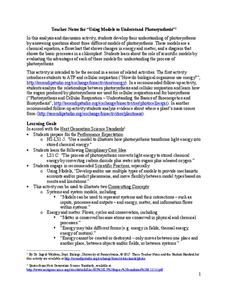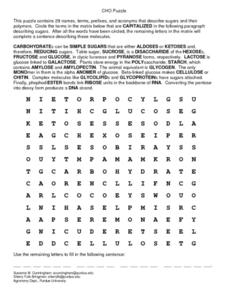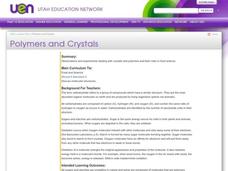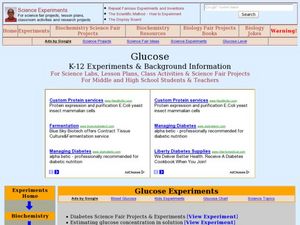Serendip
Using Models to Understand Photosynthesis
Is your class in the dark about photosynthesis? Shed some sunlight on an important biological process with a thoughtful activity. After answering questions to help determine their level of knowledge, learners work with chemical equations...
Curated OER
Testing for Life’s Molecules
Want to hear a joke about sodium? Na. Young scientists test various materials to identify if they include protein, starch, and glucose by using the Biuret test, iodine starch test, and Benedict's test respectively. After practicing with...
TED-Ed
Sugar: Hiding in Plain Sight
Did you know that you can find added sugars in three-quarters of the foods you find in grocery stores? Invite your learners to consider how much sugar exists in the food products we eat on a day-to-day basis, as well as to learn about...
Discovery Education
Urinalysis
What do lab tests reveal about a patient's health? Scholars perform a simulated urinalysis on two different patients by testing color, pH, glucose levels, and protein levels. Then, they compare their findings to what they know passes...
Howard Hughes Medical Institute
Lactose Intolerance: Fact or Fiction
Around the world, about 2/3 of adult humans are lactose intolerant. Scholars work in small groups to discuss a few statements about lactose intolerance. Then, they watch a video on the topic and readdress each statement. Whole-class...
Howard Hughes Medical Institute
Got Lactase? Blood Glucose Data Analysis
Many physicals include a blood glucose test, but what are doctors actually testing? Scholars graph and interpret blood glucose data, allowing them to observe the differences in lactase persistence and draw conclusions. They then connect...
Serendip
How Do Biological Organisms Use Energy?
When an organism eats, how does food become energy? Young biologists follow glucose through the process of cellular respiration to the creation of ADP using a discussion-based activity. The resource also highlights conservation of mass...
Serendip
Photosynthesis and Cellular Respiration
How does energy from the sun make plants grow? Scholars move step by step through the processes that promote plant propagation during a detailed lesson. The resource illustrates ADP production and hydrolysis, then allows learners to...
Serendip
A Scientific Investigation – What Types of Food Contain Starch and Protein?
You are what you eat, as they say! Are you more starch or more protein? Young scholars use their knowledge of each component to test different foods for their content. Using multiple indicators, individuals describe the protein and...
National Nanotechnology Infrastructure Network
The Blood Glucose Monitor
Become a doctor for a day! Learners analyze synthetic urine and blood samples to diagnose diabetes. They use lab procedures to identify abnormal glucose levels, and, as a follow-up activity, they build a model to illustrate the...
Chemistry Collective
Virtual Lab: Glucose Dilution Problem
There's no diluted learning here! Young chemists conduct a virtual lab exploration to practice their stoichiometry skills. By manipulating simulated solutions, they create a solution of a specific glucose molarity.
Royal Society of Chemistry
A Giant Silver Mirror Experiment
Mirror, mirror, on the wall ... who's the best chemistry teacher of them all? You'll get the vote for certain after your class completes the Silver Mirror experiment! Partnered pupils use Tollen's reagent and glucose to silverplate a...
Curated OER
CHO Puzzle
In this sugar worksheet, young scholars complete a puzzle by circling all the words in the puzzle related to sugars. The remaining letters in the puzzle create a sentence describing the sugar molecules.
Curated OER
Macromolecules
Magnify macromolecules for your biology class by having them answer these ten questions. They will define monomers and polymers, list monosaccharides, and analyze polysaccharides. In addition to assigning this to your biology class, you...
Curated OER
Polymers and Crystals: Their Role in Food Science
Blend chemistry with cooking in this exploration of polymers, carbohydrates, and food science. Experimenting with gelatin produces concrete examples of the bonding and ploymerization discussed in the lesson. Copious, comprehensive...
Curated OER
Cellular Respiration: Other Metabolites and Control of Respiration
The feedback mechanisms of metabolism of a variety of substances in the human body. Carbohydrates, lipids, amino acids, and their derivatives are explained. The biochemistry required to explain the metabolic balance and feedback controls...
Curated OER
AP: Chapter 9A: Respiration - Glycolysis
AP biologists aspire to respire with this learning exercise. In it, they write short answers to 26 questions about cellular respiration. Topics addressed include the Kreb's cycle, fermentation, and more. Written as a chapter reading...
Curated OER
Catering Middle-School Science: Monomers, Polymers, and Macromolecules
Students investigate foods. In this biology lesson plan, students will conduct testing on different types of foods as they learn about different molecules that make them up. Students will also learn about the shapes of the molecules.
Curated OER
Glucose
Students conduct various experiments on glucose. In this biology lesson, students differentiate the process of diffusion and osmosis. They test different foods for the presence of glucose and starch.
Curated OER
The Tests of Fluids for Excess Glucose, Amino Acids and Salicyclic Acid
Students test fluids for amino acids, glucose and salicyclic acid. In this chemistry indicators lesson plan, students use chromatography paper, Benedicts solution and iron chloride to test solutions for amino acids, glucose, and...
Curated OER
Photosynthesis
In this photosynthesis learning exercise, students study the illustration provided and then use the 5 words listed to fill in the blanks in the sentences at the bottom of the learning exercise. Students use the 5 words to label the...
Curated OER
Nutrient Analysis Lab
In this nutrient analysis lab instructional activity, students perform several experiments in a lab setting. Students test products for carbohydrates (monosaccharides and polysaccharides), proteins, lipids, and starches.
Curated OER
Studying Photosynthesis
In this photosynthesis worksheet, students conduct an experiment to show the making of starch in a plant's leaves during photosynthesis. Students complete 2 short answer questions.
Curated OER
Chemistry of Food
In this chemistry of food activity, students complete 20 various types of questions related to food and nutrition. First, they complete a crossword puzzle with vocabulary terms. Then, students use the figure shown to write the...
























